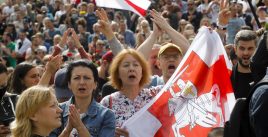
 “Our people are peacefully expressing their position. Yesterday a crowd of 400 thousand people took to the streets in Minsk without incidents. This is what’s most important.” The Episcopal Vicar for the city and region of Mogilev, Salesian Bishop Aliaksander Yasheuski, described to SIR the latest day of protests in Belarus and especially how the bishops and Catholics in the country read the words of Pope Francis at the end of the Angelus prayer. Referring to the “numerous popular protests all over the world”, the Holy Father said: “While I urge the demonstrators to present their demands peacefully, without giving in to the temptation of aggression and violence, I appeal to all those with public and governmental responsibilities to listen to the voice of their fellow citizens and to meet their just aspirations, ensuring full respect for human rights and civil liberties.”
“Our people are peacefully expressing their position. Yesterday a crowd of 400 thousand people took to the streets in Minsk without incidents. This is what’s most important.” The Episcopal Vicar for the city and region of Mogilev, Salesian Bishop Aliaksander Yasheuski, described to SIR the latest day of protests in Belarus and especially how the bishops and Catholics in the country read the words of Pope Francis at the end of the Angelus prayer. Referring to the “numerous popular protests all over the world”, the Holy Father said: “While I urge the demonstrators to present their demands peacefully, without giving in to the temptation of aggression and violence, I appeal to all those with public and governmental responsibilities to listen to the voice of their fellow citizens and to meet their just aspirations, ensuring full respect for human rights and civil liberties.”
Msgr. Yasheuski, how do you interpret these words?
First of all, it should be said that the Holy Father did not mention any particular country, including Belarus. However, as shepherds of this country, in the words of the Holy Father we recognized the situation we are currently facing. After the presidential elections on August 9, our people started taking to the streets to voice the problems and the yearning for a different and better future. While the Holy Father did not explicitly mention our country,
We see a word for us in the appeal made yesterday by the Pope.
The Pope addressed protesters and political leaders, calling for dialogue and to end all forms of violence. The people have been demonstrating for weeks. Do you believe that there is still room for a peaceful solution?
 Those are very important words. The protests in Belarus are peaceful. They are not violent in any way. The whole world is looking at us and admiring us for this. During the first days of the protests men were arrested, and women were the ones who took the lead, playing an active role. Women today represent the voices of their husbands and children. The appeal to political leaders is equally important. If decision-makers fail to engage in dialogue, they will never understand the changes people are asking for and their needs. And finally, the Holy Father called on the shepherds and the whole Catholic community to promote peaceful dialogue, initiate reconciliation processes, foster forgiveness and this is exactly what we have been doing in Belarus over the past few weeks.
Those are very important words. The protests in Belarus are peaceful. They are not violent in any way. The whole world is looking at us and admiring us for this. During the first days of the protests men were arrested, and women were the ones who took the lead, playing an active role. Women today represent the voices of their husbands and children. The appeal to political leaders is equally important. If decision-makers fail to engage in dialogue, they will never understand the changes people are asking for and their needs. And finally, the Holy Father called on the shepherds and the whole Catholic community to promote peaceful dialogue, initiate reconciliation processes, foster forgiveness and this is exactly what we have been doing in Belarus over the past few weeks.
A peaceful solution largely depends on political leaders’ resolve to engage in dialogue.
The Catholic Church in Minsk is without its archbishop, Msgr. Tadeusz Kondrusiewicz, since August 31. How are you living this absence?
 On the one hand, this decision was definitely unexpected. Our Metropolitan Bishop travelled to Poland only to celebrate and preside over religious services. His motivations were therefore not of a political nature. However, when he attempted to return, he was denied entry into the Country. The Archbishop asked to know the reasons and was told, in a letter, that his passport had been declared invalid by the internal affairs authorities. Msgr. Kondrusiewicz is a very important figure for the Catholic Church in Belarus and never made a political statement since the onset of the protests. He did not take sides and always spoke for the good of the people. He constantly called for dialogue, reconciliation, forgiveness and truth – according to the social teaching of the Church – as the Holy Father asked for yesterday at the Angelus prayer.
On the one hand, this decision was definitely unexpected. Our Metropolitan Bishop travelled to Poland only to celebrate and preside over religious services. His motivations were therefore not of a political nature. However, when he attempted to return, he was denied entry into the Country. The Archbishop asked to know the reasons and was told, in a letter, that his passport had been declared invalid by the internal affairs authorities. Msgr. Kondrusiewicz is a very important figure for the Catholic Church in Belarus and never made a political statement since the onset of the protests. He did not take sides and always spoke for the good of the people. He constantly called for dialogue, reconciliation, forgiveness and truth – according to the social teaching of the Church – as the Holy Father asked for yesterday at the Angelus prayer.
Right now, prayer is our only strength.
Catholics across the country – including non-Catholic believers – from small rural parishes to large city cathedrals, are praying for peace in Belarus and for the Archbishop’s return to his homeland.
Over the past few days, the Vatican Secretary for Relations with States, Monsignor Paul Richard Gallagher, visited the Republic of Belarus, a gesture which shows that the Vatican is attentively following this situation. As bishops, what do you hope for?
 The Holy See has always been very attentive and benevolent towards our country and it is fair to say that it continuously requested the international community to have a benevolent and friendly attitude towards our nation.
The Holy See has always been very attentive and benevolent towards our country and it is fair to say that it continuously requested the international community to have a benevolent and friendly attitude towards our nation.
For this reason, the Holy See is a friend of Belarus and of our people.
As Catholic bishops, we were very pleased about Monsignor Gallagher’s visit. When he met with the Minister of Foreign Affairs and later with the bishops of the Belarusian Episcopal Conference, he said he had come to voice the closeness of the Holy Father and the Holy See to the Belarusian people and the Catholic Church. I believe that these words say a lot and almost everything.
A few days ago the Belarusian Minister of Foreign Affairs, Vladimir Makei, reiterated the invitation to Pope Francis to visit the country. Do the current circumstances in the country prevent this possibility?
 I don’t think so. Historically, Popes have always been figures of reconciliation. Countless times the Popes fostered processes of dialogue and peace even in extremely challenging circumstances. We don’t have a pessimistic outlook, so I wouldn’t say that this situation makes it impossible. In fact it may indeed make it happen: the Papal visit may help our people find the path towards peace. I remember that when St. John Paul II visited Cuba, at a very advanced age, it was largely feared that the visit could be exploited in an instrumental way. But the Pope felt that with his presence he could contribute to the betterment of the Cuban people. This is also the style of Francis, putting the human person at the centre of his thought and action. As bishops we too reiterated our invitation to the Holy Father to visit Belarus and our faithful, and we thanked the Pope for being close to us in words and deeds.
I don’t think so. Historically, Popes have always been figures of reconciliation. Countless times the Popes fostered processes of dialogue and peace even in extremely challenging circumstances. We don’t have a pessimistic outlook, so I wouldn’t say that this situation makes it impossible. In fact it may indeed make it happen: the Papal visit may help our people find the path towards peace. I remember that when St. John Paul II visited Cuba, at a very advanced age, it was largely feared that the visit could be exploited in an instrumental way. But the Pope felt that with his presence he could contribute to the betterment of the Cuban people. This is also the style of Francis, putting the human person at the centre of his thought and action. As bishops we too reiterated our invitation to the Holy Father to visit Belarus and our faithful, and we thanked the Pope for being close to us in words and deeds.











